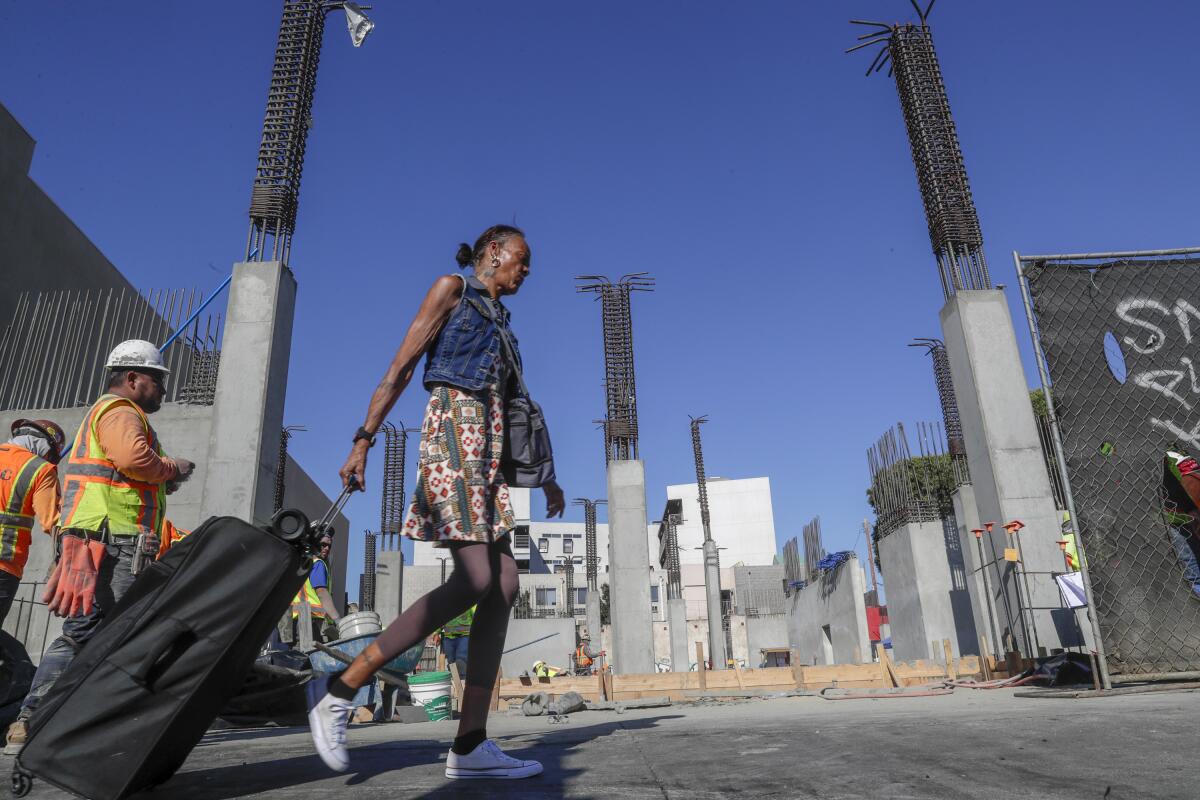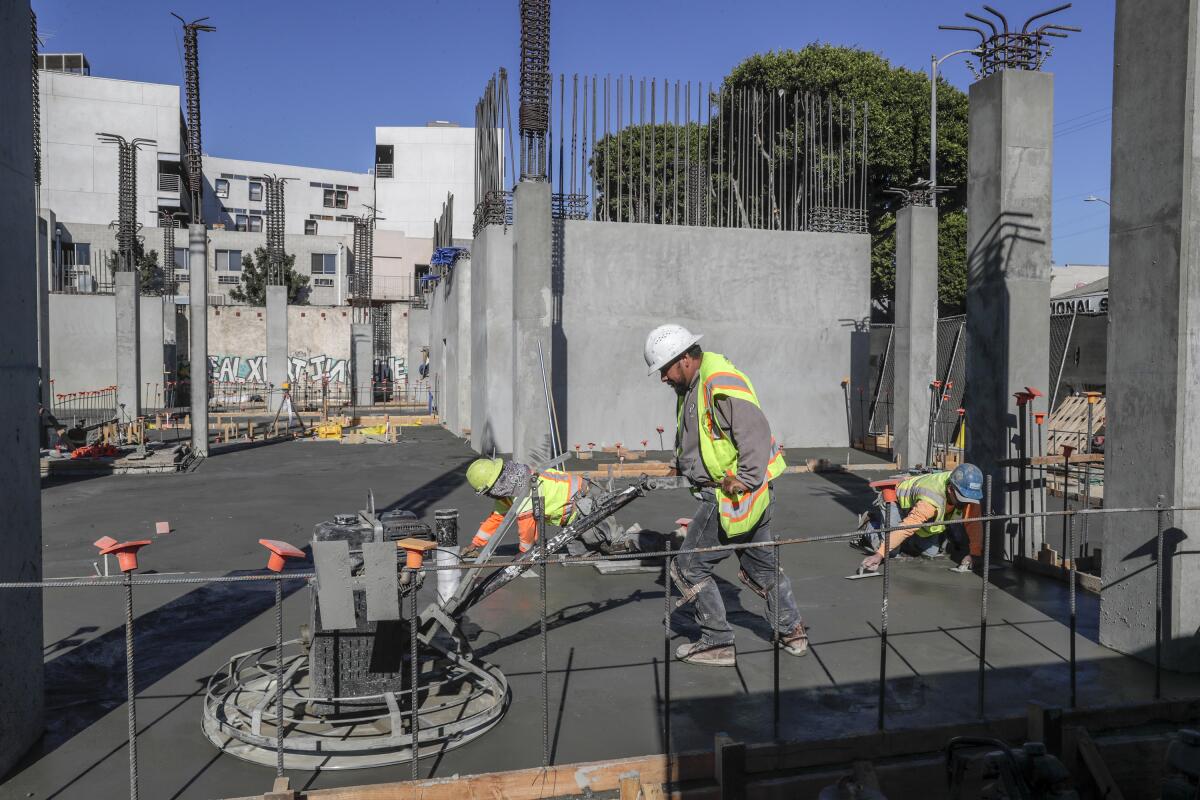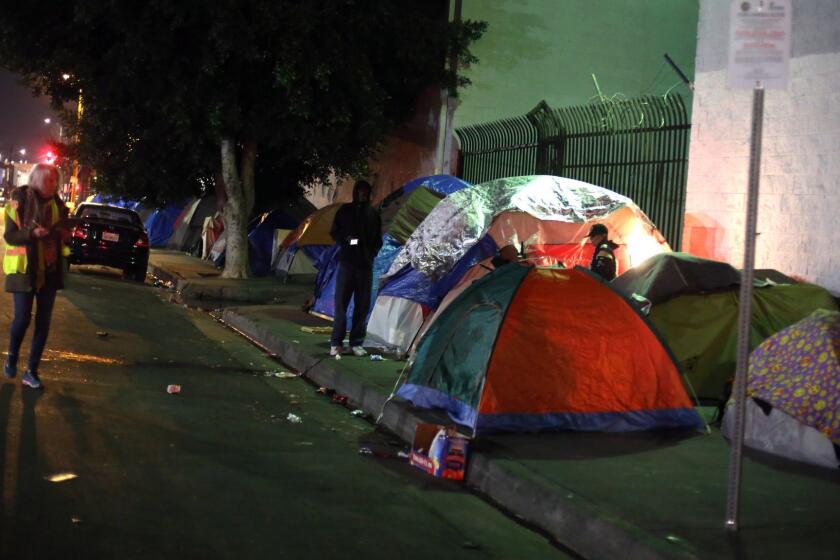$600,000 for homeless housing? Audit suggests spending money on shelters instead

With the costs of building housing on the rise, Los Angeles City Controller Ron Galperin is recommending that some projects be reevaluated to see if their budgets can be cut to use less of the cityâs $1.2-billion homeless housing bond.
In an audit that will be released Tuesday, Galperin found that more than 1,000 units of housing approved for funding through Proposition HHH could top $600,000 apiece.
âThe median cost of building many of these units approaches â and in many cases, exceeds â the median sale price of a condominium in the City of Los Angeles and of a single-family home in Los Angeles County,â according to the audit, an early copy of which was obtained by The Times.

The audit said the city should evaluate whether it can revise homeless housing projects that have such âoutlierâ costs and instead use innovations such as shared housing, modular construction and simplified financing. Any savings should then be shifted to fund shelters, bridge housing, hygiene centers and other service facilities to address more immediate needs of the cityâs homeless population, he said.
Spending on shelters and other short-term facilities and services was curtailed last year as rising costs threatened the bond programâs goal of supplying 10,000 supportive housing units for homeless people in 10 years.
The audit also highlighted the slow progress of the program, which has yet to produce a new unit of homeless housing three years after voters approved the bond in November 2016. The first two projects are scheduled to be completed later this year.
But criticism for the delays and escalating costs was muted, with the audit blaming regulatory barriers, a limited pool of developers, cumbersome permitting processes, labor costs and litigation that has blocked a city ordinance intended to streamline homeless housing projects.

âWeâre not saying we should be ashamed of HHH,â Galperin said through a spokesman. âWeâre saying we have a program that is not keeping pace with the crisis at hand. We need to figure out what changes can be made so we can better fulfill the intention voters had when they approved this proposition.â
Los Angeles Mayor Eric Garcetti released a statement on Monday calling the audit âa thoughtful lookâ that ârightfully acknowledges the deep complexity of the task before us.â
The audit suggested that the city may have moved too quickly, rushing to allocate all the funds rather than wait for new laws to take effect that would have eased the development process.
The cityâs permanent supportive housing ordinance, adopted in 2017, sought to reduce zoning and parking restrictions on HHH projects but has been stalled by lawsuits. A new state law designed to achieve much the same streamlining was signed by Gov. Gavin Newsom last month.
Meanwhile, pressed by the Proposition HHH citizen oversight committee, Garcetti has conducted an innovation challenge that resulted in committing $120 million of the bond funds to six projects with the goal of building housing faster and for less. In all, the developers would supply 975 new units at an average cost of $351,965. The ideas developed in the challenge could have saved both money and time if implemented throughout the program, the audit found.

Recently, the city also established an HHH âconciergeâ position â a person to help guide projects through approvals by multiple city departments. The audit described it as a good step, but a late one.
âEven as the city solicited and developed ideas to tackle these issues in more innovative ways, it continued to award Proposition HHH funds before some of the ideas could fully blossom,â the audit said. âThe cityâs decision to push forward and conditionally award nearly all remaining funds represents a missed opportunity to maximize the impact of Proposition HHH.â
If followed, Galperinâs proposed reevaluation could affect up to 95 homeless housing projects that have received preliminary approval, but have not reached the next stage of obtaining a development agreement with the city. The audit acknowledged that making significant changes at those stages might not be feasible, but said the city should try.
But the cityâs Housing and Community Investment Department released a statement saying that changing the terms of projects with conditional approval would be a poor business practice, âfurther delaying the pre-development process and the start of construction for the affected projects, creating new funding gaps for those projects, and reducing the time value of money in an inflationary construction cost environment.â
It would also create âa chilling effect on the development industry and damage the cityâs reputation,â the department said.
Nicholas Halaris, chairman of the HHH citizen oversight committee, said the idea of reprogramming projects with preliminary approval was âan interesting idea,â but it might be better to look forward rather than back. Los Angeles is building housing on a scale greater than anywhere else, he said.
âThere is tremendous momentum. The next batch will be better.â
The audit, which also attempted to explain why projects cost so much, dismissed the commonly cited factor of land cost as âlikely overstatedâ and instead pointed to âsoft costsâ as 40% of the projects â nearly as much as labor and materials.
âThe high level of soft costs indicates that developers are spending large amounts on non-construction activities such as fees, consultants, and financing costs,â it said.
The audit also criticized the cityâs management of the bond program as having splintered leadership and recommended formation of a centralized accounting authority for the remainder of the program. Also, it said, the city paid millions of dollars in unnecessary interest payments by borrowing on the bond before projects were ready to use the money.
More to Read
Sign up for Essential California
The most important California stories and recommendations in your inbox every morning.
You may occasionally receive promotional content from the Los Angeles Times.












